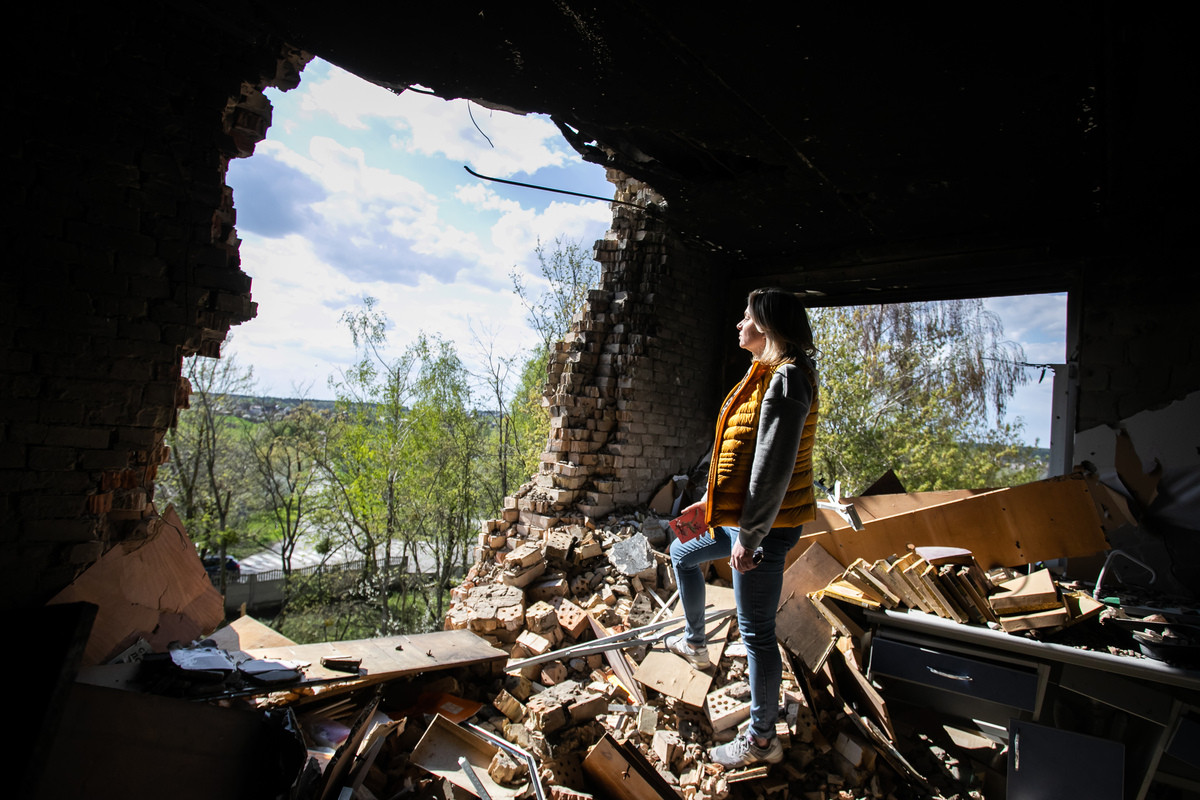Friday 24 February marks one year since Russian forces invaded Ukraine. The events of that day have had a profound impact on the country, its children and families, and our staff. Sleepless nights, losing contact with the people you love, and worrying they’ll be killed have all become part of daily life.
Our Ukraine Director, Halyna Postoliuk, has ably led our Ukrainian team through these last 12 months of war. In this time, she’s quadrupled her core team, hired over 100 new field staff, and coordinated a humanitarian response that’s supported more than 62,000 people, including 33,000 children. Here, for the first time, Halyna shares her personal reflections on the highs, lows, and learnings of what she describes as the most challenging year of her life.
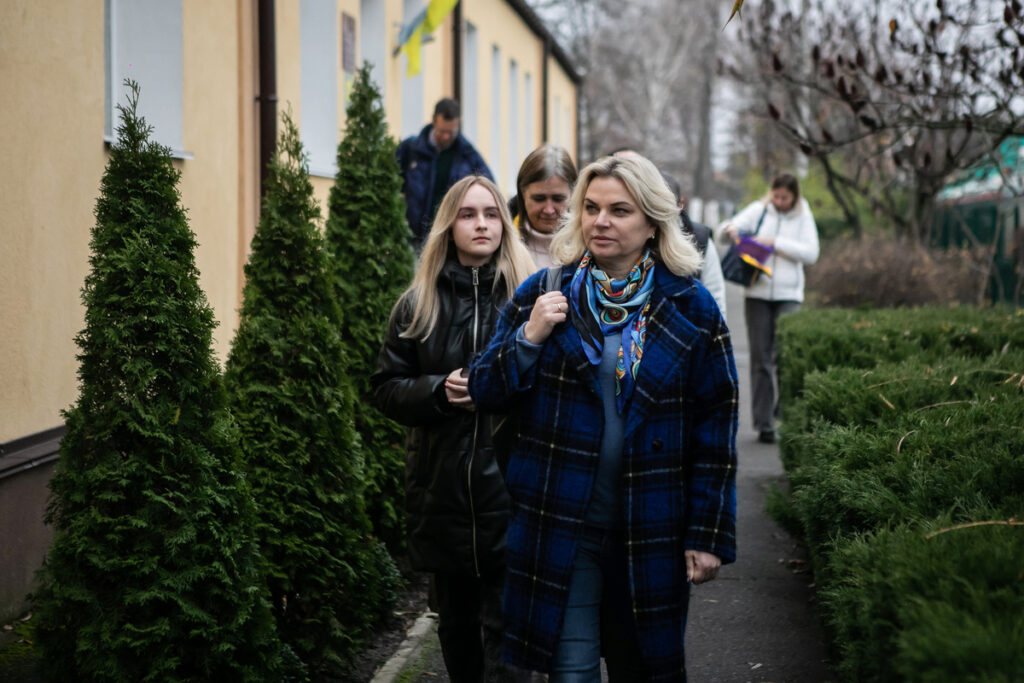
Adjusting to life in a war zone
How did the start of the war affect you and your family?
When Russian troops invaded, I was near Kyiv staying with my husband and his mother. During the first three weeks of the invasion, we were very isolated because Russian troops had blown up the bridges. We had to save food, only eating small portions twice a day, because we didn’t know when we’d be able to safely go shopping again.
The hardest thing for me personally was that my mother was trapped in occupied territory near the Belarus border. The Russians cut off all electricity, Internet and mobile signal, so I didn’t have any contact with her for weeks and it was difficult to get any news from that region. I was very worried about her.
It wasn’t until after the military left the area in April that I could finally visit her again. It was only then that I found out that a blast wave from a shell had hit her neighbour’s yard and damaged my mother’s house. But she was ok, thank goodness. Now she lives with me which is much less worrying.
I was also very worried about our team members, like Olya, our Training Manager, who was under occupation in the town of Makariv near Kyiv. She had to hide in the cellar because there was fighting in the streets and there was nothing we could do to help her. I’ll never forget the relief I felt when Olya called me and said she and her son had managed to escape and were on their way to Western Ukraine.
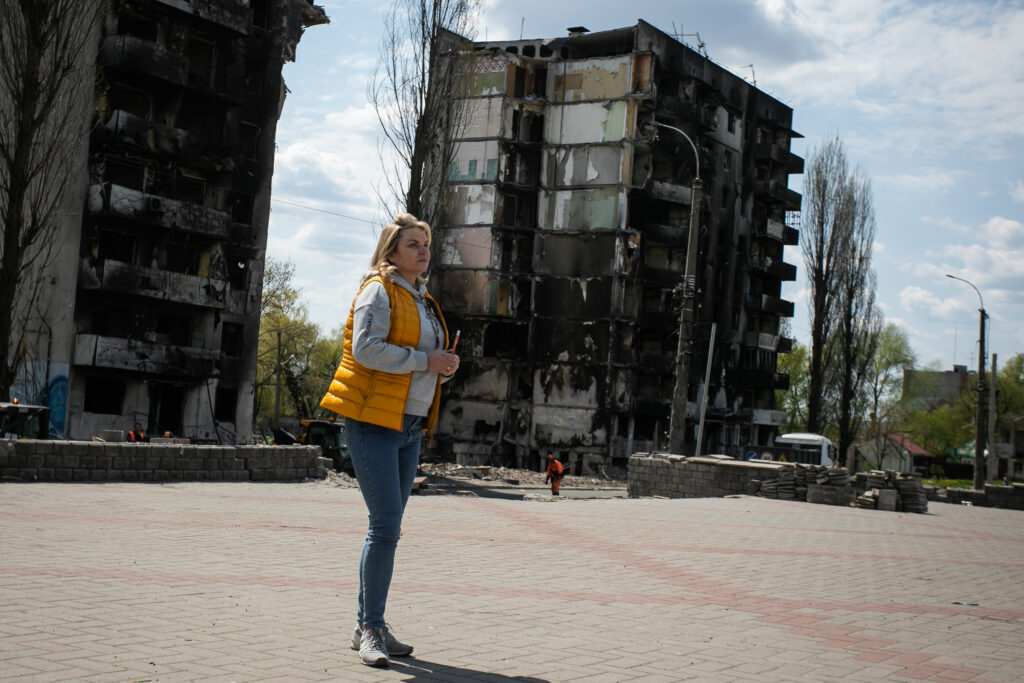
The last year must have been incredibly difficult for you and your team. What have been the biggest challenges?
I must admit it has been the most challenging year of my life. It’s hard to adjust to a life with explosions and rockets going off all around you. And it’s hard to work in that environment. It’s been hard not just because of the war itself, but because of the additional work pressure the war created. The sense of urgency we felt as a team to get support to children and families as quickly as possible was huge. That work requires funding, and getting funding requires writing funding proposals—fast. There were many fixed deadlines in those first few weeks and months. Some of us often stayed well into the night to meet them. I would encourage everybody to go home and get some rest, but everyone was so committed. No one wanted to lose the opportunity to support as many children as possible.
The biggest challenge of all has been to find staff so we could increase our operations and respond to the situation as it evolves. To give you an idea, before the war, at the start of 2022, we had just eight core staff and a small handful of consultants. Now we have 25 core staff and 102 field staff. The field staff are all specialists working in our mobile teams—social workers, psychologists, paediatricians and children’s entertainers.
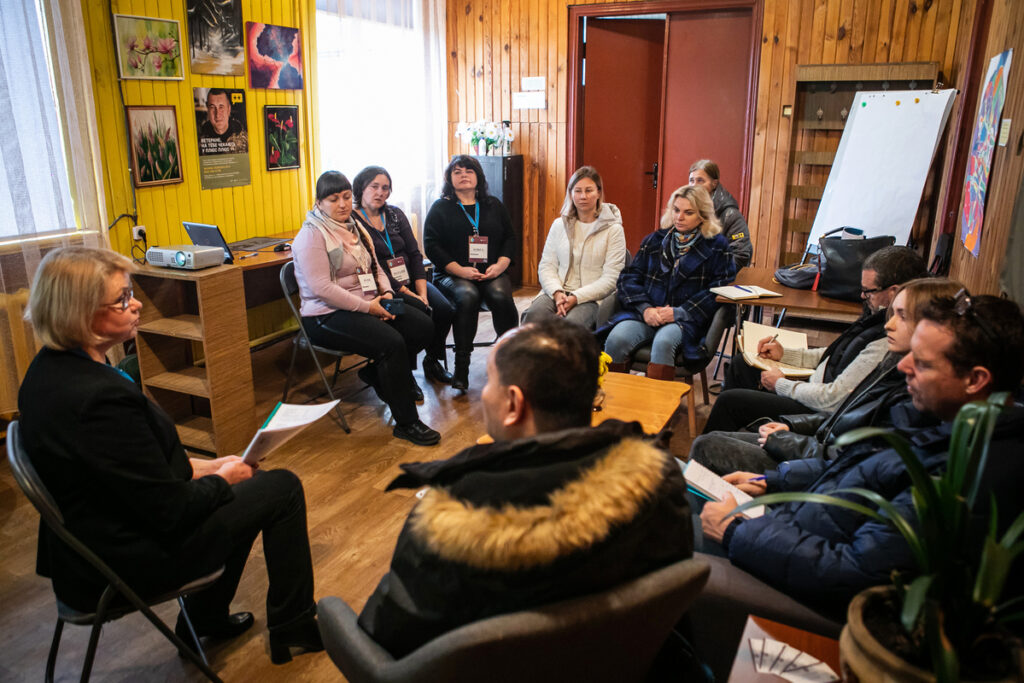
Recruiting these specialists was difficult, especially in the liberated territories like Bucha, Hostomel, and Borodyanka where most infrastructure was destroyed and many people had been killed.
With so many people still fleeing the country, it’s still a real challenge to fill key positions, like Finance Director, Communications Manager and Advocacy Manager. This means you have three times the work to do, which is hard, and makes it more difficult to prioritise.
What has it been like living and working in a war zone? And how does this affect your mental and physical health?
It’s impossible to understand what it feels like to live in a war zone until you live through it day by day. You can try to imagine, but it won’t even come close. You can’t predict how your body will react, how you’ll cope with fear, and how that will change when such an abnormal situation becomes normalised.
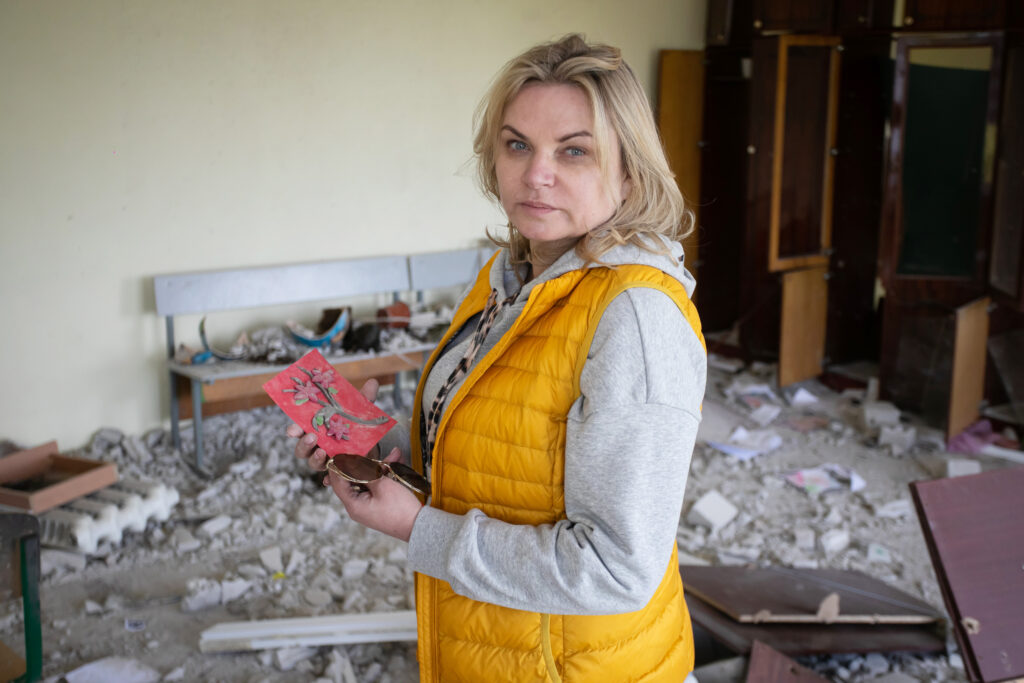
In the beginning, there were many tears and a lot of anger. But at the same time, we had a lot of determination to defend our freedom and support those most in need—everyone wanted to be useful.
We—like the families we support and all families living in Ukraine—have all witnessed mass destruction and experienced pain and grief. So many children have suffered both physically and emotionally—they’ve lost their parents, their homes and have stopped talking. They hide under the table whenever they hear loud sounds. We know of one 11-year-old boy whose hair suddenly turned grey in an instant.
Missile and drone attacks keep us awake all the time, but they don’t stop our work, which is concentrated in Kyiv and Dnipropetrovsk regions. At the moment, the situation in Dnipropetrovsk region is more dangerous as it’s closer to the front line, and the Russian artillery is constantly shelling villages and towns on the border. There are many families still living there who need support. We’re managing to visit families there and continually analyse the security situation, but whenever members of the team travel to these remote areas, I just can’t stop thinking about them and wondering—are they ok?
Of course, I’m continually concerned about our team’s wellbeing. They each have personal traumas. For example, some of our colleagues left their homes in the cities of Mariupol and Slovyansk in Donetsk region and are now trying to build a new life in Kyiv. In my case, the war has led to a real problem with not sleeping. You know, waking up every couple of hours and not being able to get back to sleep.
That’s very understandable. It must be incredibly hard to keep going when you’re not well-rested. What has kept you going?
The mission. (Halya replies instantly with utter conviction.) The people you’re helping. Remembering the results and reminding the team of what we’ve achieved. That’s what’s kept me going. That’s what’s kept us all going.
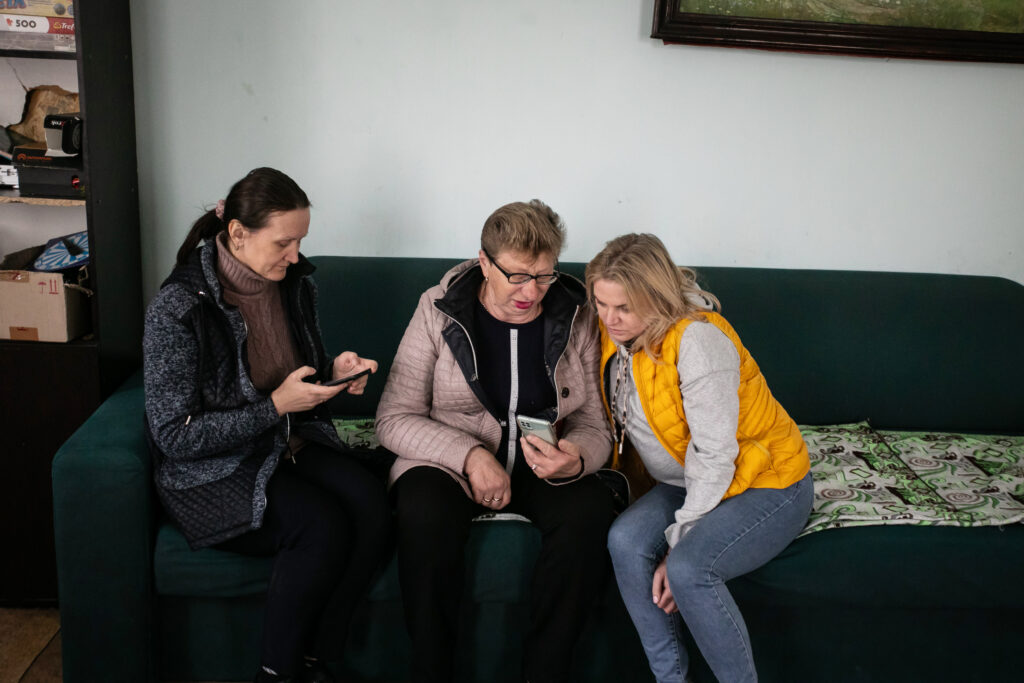
In January, I organised a two-day training session for the whole team with qualified psychologists. They taught us practical, specialist techniques to restore energy, relax, and help us cope with stress. They’re simple techniques but highly effective. For example, we learnt how to change negative thoughts into positive ones, and how to use breathing exercises to relax your body and mind and restore inner calm. And they really work. They also taught us some specific things you can do before bed to help you get to sleep, and when you wake up in the night to get back to sleep—this has been very helpful for me.
Something else that really motivated us was when Ukraine won ‘The Global A Team Award’ in our Annual Global Staff Awards, voted by colleagues across the whole organisation. This really meant a lot to us.
Achievements, reflections and learnings
Can you summarise the impact of the war on children and what your team have achieved over the last year?
The war created a child protection emergency for children in Ukraine and in the countries they fled to. Before the war, 100,000 children lived in Ukraine’s vast orphanage system. Now, thousands more children are at risk of being institutionalised, and not just because their parents have been killed by the violence. Some parents have been separated, injured, or lost their jobs, putting children at higher risk of being sent to orphanages. And during conflict, there’s always an increase in domestic violence.
Our team has advocated for the protection of children in orphanages, to ensure these children are acknowledged by the humanitarian system. We helped to evacuate the social support centre we’d been creating to Romania, and two baby homes to Switzerland and the Netherlands. And we’ve provided practical, life-saving support to 33,000 children, including psychosocial support, food, water and protection. This type of support is crucial to our mission, as supporting families to stay strong and care for their children will ensure that the child protection authorities do not place any more children in orphanages.
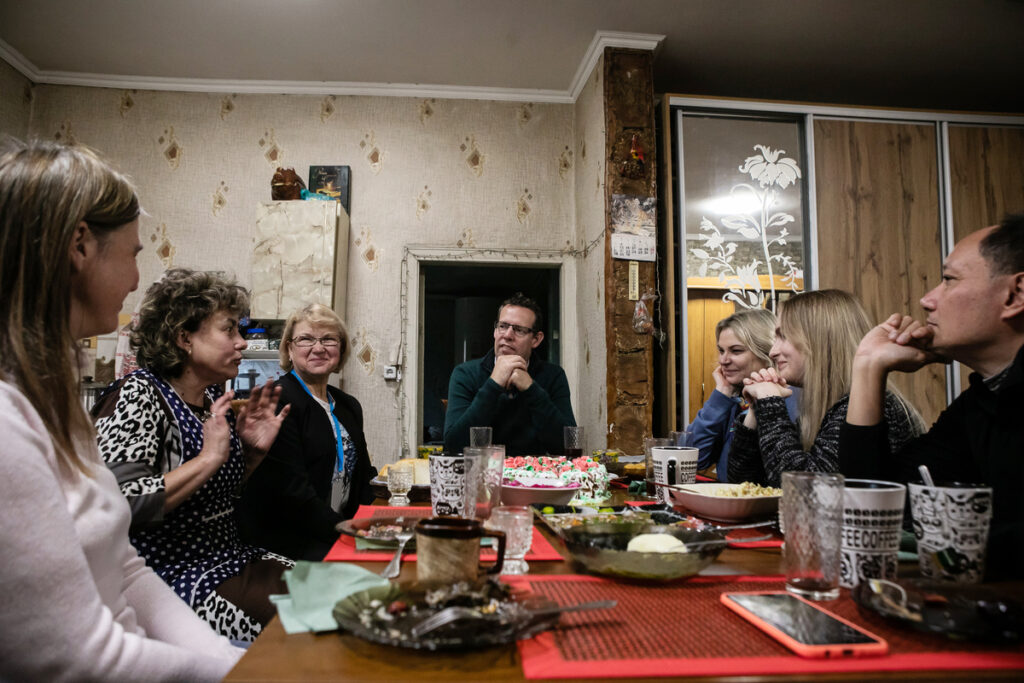
What are you most proud of your team for over the last year?
I’m proud of how much we managed to do, in so little time. We’re not a humanitarian response organisation, but last year, we had to become one. I’m proud of the new team members who came from a business background and how dedicated they’ve been. And I’m proud of how, with their help, we not only managed to provide humanitarian support, but also to respond to each family’s individual situation. We didn’t just give them food, clothes and hygiene products but also helped with their specific and often complex needs, like counselling, medical care, help finding work and help registering for government schemes. It was incredibly difficult to support so many families in this way, but we did it. Most of all, I’m proud of the sheer number of children and families we’ve helped so far – 62,000 people. That’s a lot.
How have you celebrated your achievements as a team?
We celebrated our results by making a video. It was satisfying to reflect on and share our successes. In December, we had an end-of-year party, did a cooking masterclass together and made Christmas decorations, which was good fun. And in January, we held a roundtable discussion with our field staff to celebrate our successes and make plans for the future.
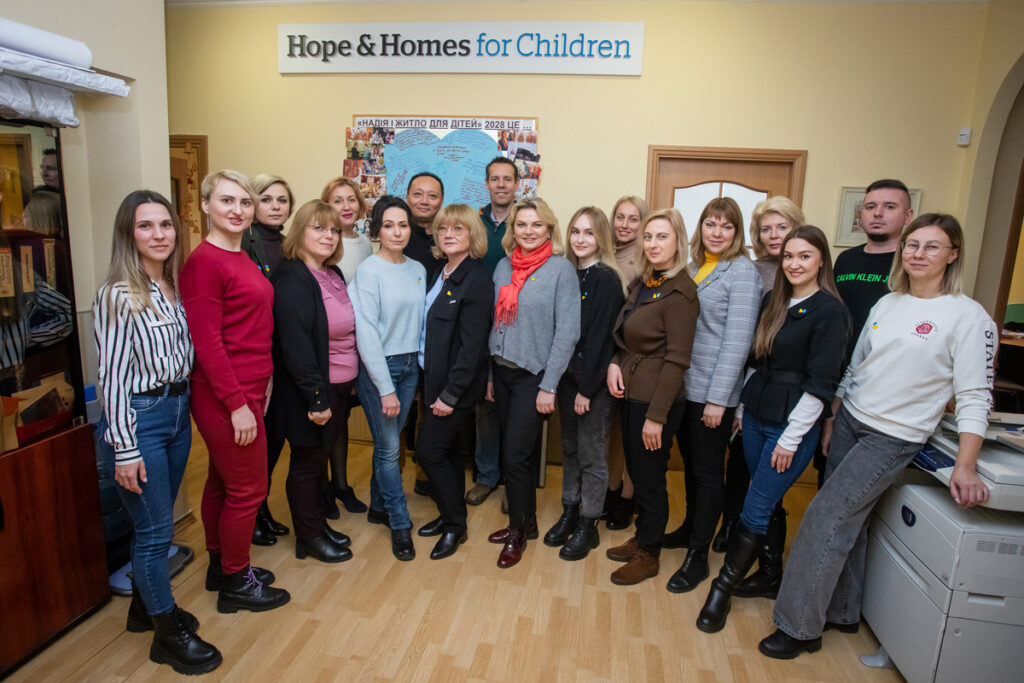
With 2022 behind you, what are you most looking forward to in 2023?
I’m looking forward to having more time to think. Because when the war broke out, we had to do a lot of things in a rush. Take the UNICEF project for example—that was a one-million-dollar project and we only had one week to write the proposal. Also, more time to refine processes. As I said, we’ve gone from a team of eight to a team of 25 office staff and 102 field staff in the space of a few months. Improving processes will help things run more smoothly.
It’s going to be another challenging year, but we are stronger now. We have promising opportunities for funding our plans and for the state to make childcare reform possible. There are good signs—declared political will and promised support from the EU. This year, we won’t just continue our critical humanitarian support, but will also focus on developing services for children and families including children with disabilities. We’ll continue to advocate for proper child protection and care reform. This year is about emergency support to children and families, development and building stability—a new and better child protection system.
Is there anything you’ve learned from last year that you feel will help you going forward?
Yes. My personal lesson is the importance of not letting the full weight of the work sit too heavily on your shoulders, but breaking it up into smaller chunks. See what you can delegate, and find somebody to help you with that task—it’s easier said than done, though!
In the second half of Halyna’s interview, ‘Setbacks and opportunities: the journey to childcare reform in Ukraine‘ she explains how the war’s affecting our long-term mission and her team’s concerns and priorities for 2023.
Donate to support our team in Ukraine
Help Halyna and her team reach more families with vital support
